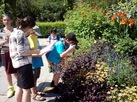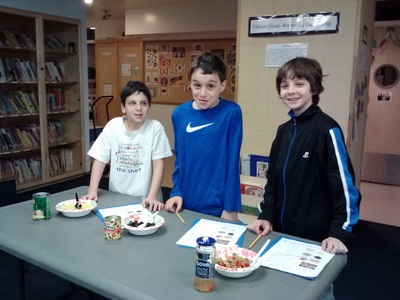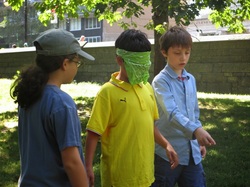In The News
Hebrew Immersion programs are taking off...
Strategic Hebrew featured in a survey of summer 2014 immersion programs by Talia Lavin of JTA. Strategic Hebrew Founder, Amy Fechter, receives the 2013 Grinspoon-Steinhardt Award for Excellence in Jewish Education. Strategic Hebrew debuts in The Jewish Week in a lovely retrospective of the Jewish Journey Project's inaugural year by Julie Weiner: New Hebrew school model engages student motivation to drive learning |
 Conservatory Garden Scavenger Hunt
Conservatory Garden Scavenger Hunt
A number of language-related articles have been published in the news media, all giving credence to the benefits of learning a second language and to the interactive, activity based Strategic Hebrew approach.
"What is your Jewish Handshake?"
Andrew Silow-Carroll describes the feeling of belonging to a Jewish community that comes with familiarity with Grace After Meals.
Begin your personal Birkat Hamazon (Grace After Meals) journey by ordering one of our interactive workbooks today.
Thomas S. Redick embarks on a 3 year study to determine whether language acquisition can be predicted.
His methods of instruction mirror the Strategic Hebrew approach:
[1] "Speak the language out loud. You can't expect to learn the language by just reading it and repeating words in your head....
[2] And don't worry about making grammatical errors when conversing while talking to native speakers"
Dr. Steven Krashen researches two important principles that support the Strategic Hebrew approach:
"[1] The ability to speak is not the road to, but the result of, language acquisition. When a baby utters her first words, she has already acquired the language....
[2] Children should just be given opportunities to listen to someone speak that language to them, either through play, storytelling or daily routines."
Maneesh Sethi describes his experience learning a language in 90 days through a process called Rapid Language Learning.
"In actuality, by doing worksheets, we are practicing for just that—doing worksheets. But if you want to learn to speak, well, you actually have to practice by speaking."
Guy Sharett teaches Hebrew in a walking classroom of Tel Aviv streets.
Excellent example of how to make language learning engaging and relevant.
"The Bilingual Advantage."
Cognitive neuroscientist, Ellen Bialystok, who has spent almost 40 years learning about how bilingualism sharpens the mind, describes some of the advantages of second language acquisition.
"What is your Jewish Handshake?"
Andrew Silow-Carroll describes the feeling of belonging to a Jewish community that comes with familiarity with Grace After Meals.
Begin your personal Birkat Hamazon (Grace After Meals) journey by ordering one of our interactive workbooks today.
Thomas S. Redick embarks on a 3 year study to determine whether language acquisition can be predicted.
His methods of instruction mirror the Strategic Hebrew approach:
[1] "Speak the language out loud. You can't expect to learn the language by just reading it and repeating words in your head....
[2] And don't worry about making grammatical errors when conversing while talking to native speakers"
Dr. Steven Krashen researches two important principles that support the Strategic Hebrew approach:
"[1] The ability to speak is not the road to, but the result of, language acquisition. When a baby utters her first words, she has already acquired the language....
[2] Children should just be given opportunities to listen to someone speak that language to them, either through play, storytelling or daily routines."
Maneesh Sethi describes his experience learning a language in 90 days through a process called Rapid Language Learning.
"In actuality, by doing worksheets, we are practicing for just that—doing worksheets. But if you want to learn to speak, well, you actually have to practice by speaking."
Guy Sharett teaches Hebrew in a walking classroom of Tel Aviv streets.
Excellent example of how to make language learning engaging and relevant.
"The Bilingual Advantage."
Cognitive neuroscientist, Ellen Bialystok, who has spent almost 40 years learning about how bilingualism sharpens the mind, describes some of the advantages of second language acquisition.


